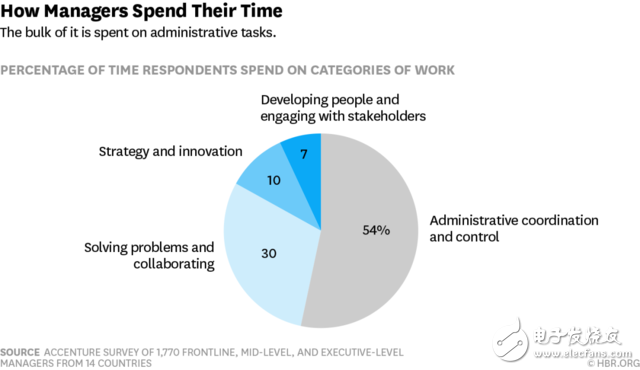The Harvard Business Review recently wrote an analysis of how managers of various organizations should respond to and use artificial intelligence.
The following is the original content:
The subversive effects that artificial intelligence can bring to various professions have already sounded a lot of alarms, especially those that are easy to automate. But managers at all levels must also adapt to a world full of smart machines. In fact, artificial intelligence can quickly accomplish many administrative tasks that consume a lot of time for managers faster, better, and cheaper.
From the front line to the top executives, how can managers continue to succeed in the era of artificial intelligence? To find out, we surveyed 1,770 managers in 14 countries and interviewed 37 executives responsible for digital transformation within their organization, and finally identified five major steps that successful managers need to take. .

1. Hand over administrative tasks to artificial intelligence
According to the survey, managers at all levels spend half of their time on tasks such as administrative coordination and control. (For example, a typical store manager or head nurse in a nursing home must constantly adjust the shift to deal with sick, vacation, or sudden departures.) Managers expect artificial intelligence to have the most significant impact on these areas. Their ideas are correct: artificial intelligence does automate many of these tasks.
Writing a report is another relevant example. With the help of artificial intelligence software robots, the Associated Press has increased the number of reports in the corporate quarterly report from about 300 to 4,400. In this way, technology can free up more time for journalists to write survey reports and interpretative reports.
Such technology may also help you draft management reports in the future. In fact, this has become possible in some areas of analytical management reporting. Recently, data analysis company Tableau announced a partnership with NarraTIve Science, a Chicago natural language generation tool provider. The two companies collaborated to develop NarraTIves for Tableau, a free Chrome extension that automatically creates a written explanation of Tableau's images.

The interviewed managers believe that this change has a positive meaning: 86% said they want to use AI to support monitoring and reporting.
2, focus on judgment work
The insights required for many decisions are not what artificial intelligence can do with data alone. This requires managers to make full use of their understanding of the organization's development history and culture, but also to integrate empathy and ethical reflection. This is at the heart of human judgment – ​​using experience and skills to make critical business decisions.
The managers of our surveys have felt this change. They believe that judgment-oriented creative thinking and ability to try, data analysis and interpretation, and strategic development are three of the four latest skills that future managers will achieve.
As Layne Thompson, director of ERP Services at the US Navy's IT department, said: “Managers are more aware than ever that they need to have the power of judgment, experience and improvisation, rather than simply following the rules. If you say One of the potential of machine learning is to help us make decisions, and that technology should be seen as a support rather than a replacement for managers."
3. Treat smart machines as "colleagues"
If managers see artificial intelligence as a colleague, they will understand the truth: there is no need to compete with the machine. While human judgment is unlikely to be automated, smart machines can provide much help for this type of work, support people's decision-making processes, perform data-driven simulation calculations, and even search and discover activities. In fact, 78% of managers surveyed believe that they can trust the advice provided by intelligent systems in the process of making business decisions in the future.
Kensho Techonlogies tried to seize these opportunities. This is an emerging investment analysis provider. The company's system allows investment managers to ask investment-related questions in plain English, for example, “Which sectors and industries perform best in the three months before and after the interest rate hike?†Get the answer in a few minutes. It's not hard to imagine that such a technology can provide tremendous support to individuals and team leaders in assessing the outcome of decisions and considering the various possible processes.
Artificial intelligence not only enhances the efficiency of managers, but also allows managers to interact better with smart machines through dialogue or other intuitive means. Artificial intelligence will become an assistant and consultant on call.
4. Work like a designer
While managers' own creativity is important, perhaps more important is their ability to use the creativity of others. Managers - Designers can bring together a wide variety of ideas into a complete, workable and attractive solution. They integrate design thinking into team and organizational management.
One-third of the managers we surveyed believe that the creative thinking and experimental ability of AI gradually take over the future of routine administrative work is the key to their future success.
Peter Harmer, CEO of the Australian Insurance Group, stressed that in digital companies, managers need to be able to foster collaborative creativity. “What we need is someone who can really combine ideas. Not those who can come up with good ideas, but people who can combine two or three ideas to make a difference. This is creativity, and that’s curiosity."
5. Develop social skills and build a network of people
The managers interviewed are aware of the value of judgment. But they underestimate the importance of in-depth social skills that are critical to networking, training, and collaboration, so they can help them stand out in the future world where many administrative and analytical functions are handed over to artificial intelligence.
While they will use digital technology to mine information and even judges about partners, customers, and communities, they must establish and aggregate different perspectives, analyses, and experiences.

Towards success
Artificial intelligence will eventually become a cheaper, more efficient, and even more equitable technology. But managers should not be worried about this, it just means that their focus will shift to areas where only humans can do it.
Writing a financial report is one thing, but only humans can extract information that can communicate with employees and convey a sense of purpose. Tracking plans and resources may soon become the task of the machine, but the drafting strategy remains a human-specific task. In short, we recommend using artificial intelligence to automate administrative processes and enhance human decision-making capabilities, but not using machines to replace humans for decision making.
The current shortage of analytical talents should give us a lesson: major organizations can no longer wait to see if their managers can work side by side with artificial intelligence. As technology continues to share more and more day-to-day work for humans, human-led work will become more and more important. In order to prepare yourself and your organization for this, the leader must take the following steps:
Explore as early as possible. To explore an uncertain future, managers must experiment with artificial intelligence and apply their insights to the next phase of the experiment.
Adopt new key performance indicators to drive technology adoption. Artificial intelligence will introduce new standards of success: collaborative capabilities, information sharing, experimentation, learning and decision making, and the ability to think beyond the limits of an organization.
Develop training and recruitment strategies for creativity, collaboration, empathy and judgment. Leaders should develop a diverse workforce and management team that balances experience with creativity and social intelligence – each side complements the other and supports reliable collective judgment.
Although this kind of subversion will not happen overnight, the speed of development is accelerating, and the far-reaching significance behind it far exceeds the expectations of most managers. Those who have the ability to assess the state of the future workforce can better meet the arrival of artificial intelligence. In their view, this is a rare opportunity to succeed.
Closed impellers have a back and front wall around the vanes, to increase strength. Closed impellers are used primarily in larger pumps and can be used in applications that handle suspended-solid service.
These types of impellers are commonly found in clear liquid applications. They don't do well with solids and are difficult to clean if they become clogged.
Still not sure which impeller will be best for your next pumping application? Be sure to check wtih an application engineer who is well versed in pumps and selection best practices.
Closed Impeller,Closed Impeller Design,Closed Impeller Pump,Semi Closed Impeller
Shenyang Zhicheng Heavy Machinery Manufacturing Co., Ltd. , https://www.zhichengmachinery.com
